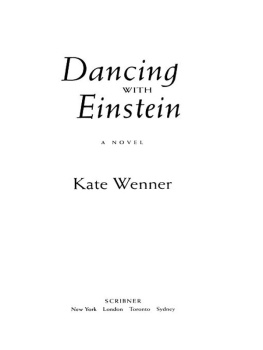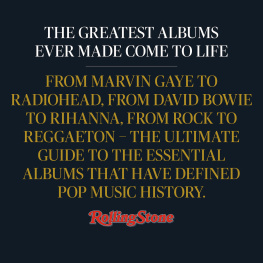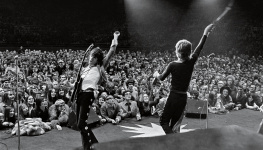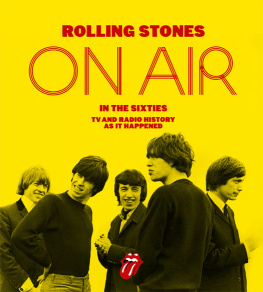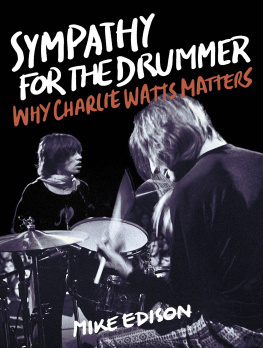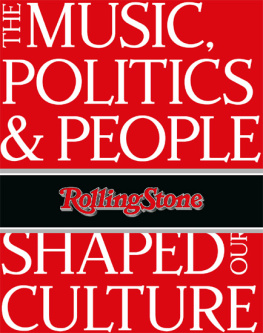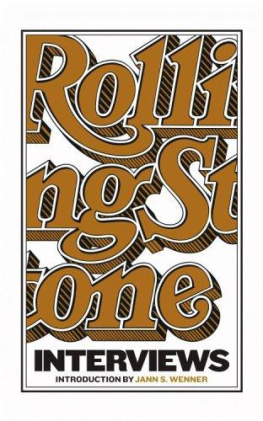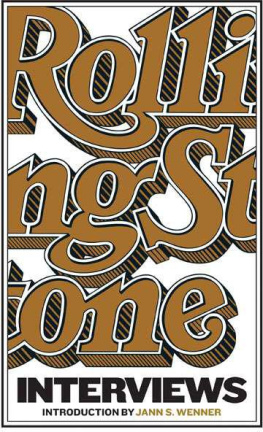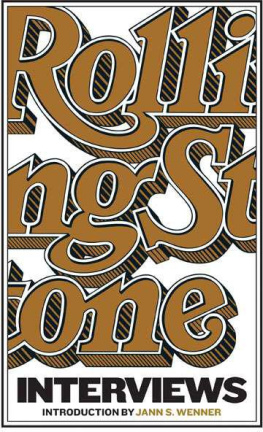Wenner - The Rolling Stone Interviews
Here you can read online Wenner - The Rolling Stone Interviews full text of the book (entire story) in english for free. Download pdf and epub, get meaning, cover and reviews about this ebook. year: 2007, publisher: Little, Brown and Company, genre: Detective and thriller. Description of the work, (preface) as well as reviews are available. Best literature library LitArk.com created for fans of good reading and offers a wide selection of genres:
Romance novel
Science fiction
Adventure
Detective
Science
History
Home and family
Prose
Art
Politics
Computer
Non-fiction
Religion
Business
Children
Humor
Choose a favorite category and find really read worthwhile books. Enjoy immersion in the world of imagination, feel the emotions of the characters or learn something new for yourself, make an fascinating discovery.

- Book:The Rolling Stone Interviews
- Author:
- Publisher:Little, Brown and Company
- Genre:
- Year:2007
- Rating:4 / 5
- Favourites:Add to favourites
- Your mark:
- 80
- 1
- 2
- 3
- 4
- 5
The Rolling Stone Interviews: summary, description and annotation
We offer to read an annotation, description, summary or preface (depends on what the author of the book "The Rolling Stone Interviews" wrote himself). If you haven't found the necessary information about the book — write in the comments, we will try to find it.
The Rolling Stone Interviews — read online for free the complete book (whole text) full work
Below is the text of the book, divided by pages. System saving the place of the last page read, allows you to conveniently read the book "The Rolling Stone Interviews" online for free, without having to search again every time where you left off. Put a bookmark, and you can go to the page where you finished reading at any time.
Font size:
Interval:
Bookmark:
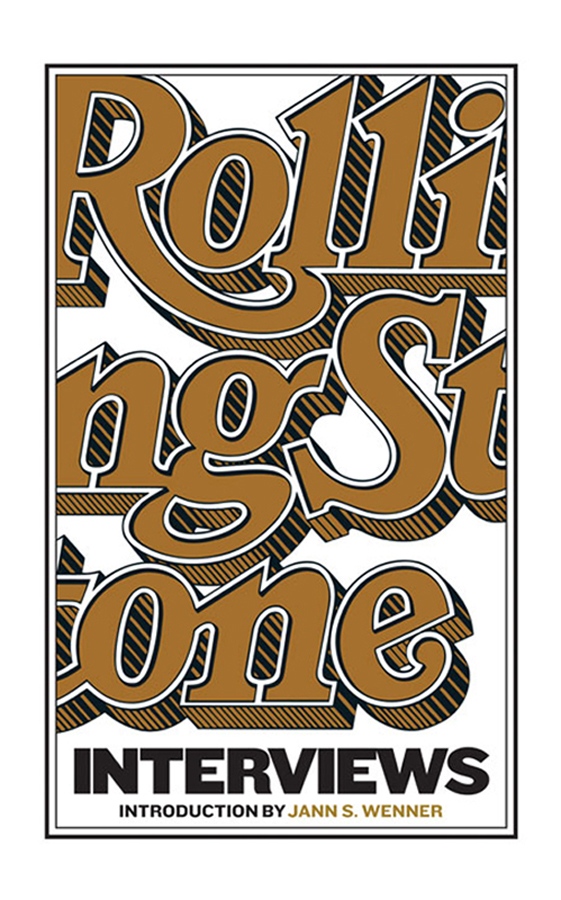
Copyright 2007 by Wenner Media LLC
All rights reserved. Except as permitted under the U.S. Copyright Act of 1976, no part of this publication may be reproduced, distributed, or transmitted in any form or by any means, or stored in a database or retrieval system, without the prior written permission of the publisher.
Little Brown and Company
Hachette Book Group
237 Park Avenue, New York, NY 10017
Visit our website at www.HachetteBookGroup.com
The Little Brown and Company name and logo are trademarks of Hachette Book Group, Inc.
First eBook Edition: November 2007
ISBN: 978-0-316-02313-9
On August 14, 1968, the Who finished a show at the Fillmore West with My Generation. Pete Townshend did not smash his guitarnot that nightand I wanted to know why. So I made my way backstage to ask him if hed sit for an interview with Rolling Stone.
I wanted to know much more, in fact: where Pete grew up, what shaped his music, what his relationship with Roger Daltrey was like, what he thought rock & roll could accomplish, what his plans for the band were. We went back to my house, started talking at two A.M. and finished sometime after dawn. Pete was articulate, passionate, and lost in his own thoughts (at one point, he asked if Id dosed his orange juice with LSD; I hadnt). He talked about the Whos next album, a project he was then calling Deaf, Dumb, and Blind Boy. A year or so later, he told me it was the first time hed ever sketched out the whole plan for Tommy, even for himself.
That was the first fully realized Rolling Stone Interview. Wed included Q&As starting with the first issue of the magazineone of our goals had always been delivering the voices of the artists behind the musicbut this went deeper. It accomplished everything I loved about the in-depth interviews with writers in The Paris Reviewit brought you into the working process of the artistand it also opened up the private life and aspirations of a defining force in popular culture, the way the Playboy Interview did. In those days, The Paris Review and Playboy were the only places you could read a thoughtful, in-depth magazine interview, and no one was bringing the same rigor and seriousness of purpose to rock & roll.
Rolling Stone was different. From the start, we were devoted not only to rock & roll but to the culture and politics that surrounded the music, that shaped it and were shaped by it. And though we knew how to have fun (we did, after all, offer a roach clip as a subscription premium with our February 24, 1968, issue [RS 6]), we were all about seriousness of purpose. These were not casual interviews. Our reporters researched their subjects deeply, and the musicians we spoke with responded. They were bored by the short-form interviews they did with fan magazines and radio stations. We presented them with a new opportunity to articulate what they were thinking and doing, to communicate with their audience in a direct and unfiltered way.
The Rolling Stone Interview gained prestige quickly. Prestige and sizenowhere else could you read ten or fifteen pages of Jerry Garcia talking about his childhood, the first music he loved, his experiences in the army, and the days of the Acid Tests. And we spoke not just with musicians but with writers, directors, philosophers, presidents and religious leaders as well.
Sometimes these interviews lasted for hours; sometimes they stretched over days or even months. Over a period of weeks in 1969, Jerry Hopkins spoke with Jim Morrison at the Doors management office in Los Angeles, a nearby bar, and a strip club where Morrison was a regular. In 1973, Johnny Cash was so pleased that the magazine wanted to speak with him at the ripe old age of forty (Ive often read those interviews and wondered if theyd be interested in someone like me, he said) that he sat with Robert Hilburn in his Las Vegas hotel suite after finishing a midnight show, then invited Hilburn back for more the following morning over breakfast. Neil Young broke a years-long silence in 1975 to talk with Cameron Crowe (the coup landed Cameron a staff job); they talked for so long Cameron ran out of tapes and Neil had to give him some cassettes that had alternate takes of his songs on them. (Yes, he recorded over them, but later he did also capture a long band rehearsal of then-unreleased Cortez the Killer.) I remember the interview that Charles Reichthe author of The Greening of America and a Yale law professorand I conducted with Jerry Garcia in 1971. We spent hours in the July heat on the front lawn of Jerrys house near Mount Tamalpais in northern California, overlooking the Pacific Ocean. A few days later, Reich attended a Grateful Dead recording session to get more, and then he went back a few weeks after that to talk with Jerry for another two hours. In the fall, I spent four more hours giving the whole thing a more journalistic perspective. The resultboth far ranging and incredibly specificran in two issues of the magazine and eventually was published in book form.
From the start, our subjects were explorers, discussing things for the first time. And we were exploring right along with them, finding new journalistic territory as we went. We were hungry for insights, for the stories of how the music and culture we loved came to be, and who the people who made it were. We wanted revelations, and we got them. In December of 1970, I interviewed John Lennon in New York at the time of the release of his first solo album, Plastic Ono Band (still one of the most painfully honest and greatest rock records ever made). Rolling Stone already had a long history with John and Yoko (when the cover of their Two Virgins album was banned, Rolling Stone cofounder Ralph J. Gleason had the idea of putting it on the cover of our first anniversary issue [RS 22]). Lennon chose the magazine to discuss the devastating pain behind the dissolution of the Beatles.
Remember that the Beatles had been hermetically protected for years, and however much their image had changed, much of the world clung to the fantasy that they were the same clean-cut boys whod worn matching suits on The Ed Sullivan Show. Lennons Rolling Stone Interview ended all that. He lifted the curtain on the orgies that accompanied life on the road (The Beatles tours were like the Fellini film Satyricon), spoke frankly about the bands drug use (Help was where we turned onto pot and we dropped drink, simple as that) and went through the Beatles catalog song by song, the first time hed ever discussed the bands music in this kind of detail ( Yesterday I had nothing to do with.... Eleanor Rigby I wrote a good half of the lyrics or more). For weeks afterward it was everywhere, because none of the other Beatles had yet publicly explained the breakup of the band. The effect was shocking. One has to completely humiliate oneself to be what the Beatles were, Lennon said. And thats what Im saying with this albumI remember what its all about now, you fuckers, fuck you all! Thats what Im saying: You dont get me twice.
That strong, unfiltered voice was everything I wanted the Rolling Stone Interview to be. The best interviews of the past forty yearsexcerpts of which are collected in this volumeare documents of the individuals and of the times. They are visits as well as interviews, and they bring you face-to-face with the person talking. While we clean up the syntax to make it more readableremove the ums,ahs and repetitionswe also preserve the speech and idiosyncrasies of the subject. Over the years, I stressed to editors and writers that the interviewer has to establish himself as a stand-in for the readershow a little bit but not too much of his own personality, and know when not to get in his subjects, or the readers, way. An interviewer gets to go somewhere every reader would love to, whether its the dressing room after a show or a private home, and he has to deliver that experience to the reader. Sometimes that means bonding with the subject; sometimes it means challenging the subject. The
Font size:
Interval:
Bookmark:
Similar books «The Rolling Stone Interviews»
Look at similar books to The Rolling Stone Interviews. We have selected literature similar in name and meaning in the hope of providing readers with more options to find new, interesting, not yet read works.
Discussion, reviews of the book The Rolling Stone Interviews and just readers' own opinions. Leave your comments, write what you think about the work, its meaning or the main characters. Specify what exactly you liked and what you didn't like, and why you think so.

